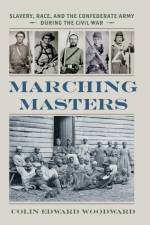- Slavery, Race, and the Confederate Army during the Civil War
av Colin Edward Woodward
409,-
The Confederate army went to war to defend a nation of slaveholding states, and although men rushed to recruiting stations for many reasons, they understood that the fundamental political issue at stake in the conflict was the future of slavery. Most Confederate soldiers were not slaveholders themselves, but they were products of the largest and most prosperous slaveholding civilization the world had ever seen, and they sought to maintain clear divisions between black and white, master and servant, free and slave. In Marching Masters Colin Woodward explores not only the importance of slavery in the minds of Confederate soldiers but also its effects on military policy and decision making. Beyond showing how essential the defense of slavery was in motivating Confederate troops to fight, Woodward examines the Rebels' persistent belief in the need to defend slavery and deploy it militarily as the war raged on. Slavery proved essential to the Confederate war machine, and Rebels strove to protect it just as they did Southern cities, towns, and railroads. Slaves served by the tens of thousands in the Southern armies-never as soldiers, but as menial laborers who cooked meals, washed horses, and dug ditches. By following Rebel troops' continued adherence to notions of white supremacy into the Reconstruction and Jim Crow eras, the book carries the story beyond the Confederacy's surrender. Drawing upon hundreds of soldiers' letters, diaries, and memoirs, Marching Masters combines the latest social and military history in its compelling examination of the last bloody years of slavery in the United States.

